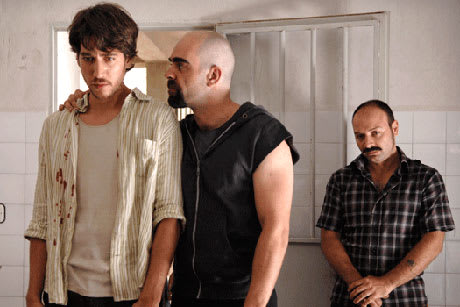Having won a slew of Goya awards (the Spanish equivalent of the Academy Awards), including Best Picture, beating out such titles as Agora and Broken Embraces in 2010, the expectation of Cell 211 is that it would be an intelligent and impeccably made work of unique stature.
Unfortunately, it has neither the intellect of Agora nor the cinematic panache of Broken Embraces, being a mediocre, but extremely well acted and tense, exercise in solipsized male perspective and posturing.
It makes sense though, being a movie that features a cast comprised almost entirely of men, save protagonist Juan Oliver's (Alberto Ammann) pregnant wife, Elena (Marta Etura). Inevitably, she's merely a passive victim of male bartering and dreadful contrivance, panicking when she finds out her husband has wound up in the middle of a prison riot after going to work early for his new prison guard gig, obliquely reinforcing the folly of alacrity.
Although she shouldn't fret too much, since Juan, after pulling out his junk for the prisoners to critique, poses as an inmate, bonding with ersatz riot leader Malamadre (Luis Tosar) over stuff like loyalty and having balls and whatnot.
As tensions escalate and demands are made, Juan proves helpful to the prisoners, gradually identifying with their struggle when unlikelihoods compound and his wife winds up on the receiving end of a prison guard's baton for no reason at all beyond convenience of narrative tropes.
Even though the actual plot is laughable and the exploration of criminality as an arbitrary mode of placement in time relating to passion is tenuous, the actual handling of the action sequences and prisoner interactions is believably gritty. It's easy to engage in the happenings with such a propulsive narrative and lead actors that invest fully in their roles, trying their damnedest to sell mere caricatures.
But from the opening scene – where an inmate graphically slits his wrists and slowly bleeds to death – it's clear that every moment is intent on generating shock and awe rather than finding any sort of organic trajectory. This is why the actual story is so clumsy in executing rudimentary themes: it's far too preoccupied with being cool.
(eOne)Unfortunately, it has neither the intellect of Agora nor the cinematic panache of Broken Embraces, being a mediocre, but extremely well acted and tense, exercise in solipsized male perspective and posturing.
It makes sense though, being a movie that features a cast comprised almost entirely of men, save protagonist Juan Oliver's (Alberto Ammann) pregnant wife, Elena (Marta Etura). Inevitably, she's merely a passive victim of male bartering and dreadful contrivance, panicking when she finds out her husband has wound up in the middle of a prison riot after going to work early for his new prison guard gig, obliquely reinforcing the folly of alacrity.
Although she shouldn't fret too much, since Juan, after pulling out his junk for the prisoners to critique, poses as an inmate, bonding with ersatz riot leader Malamadre (Luis Tosar) over stuff like loyalty and having balls and whatnot.
As tensions escalate and demands are made, Juan proves helpful to the prisoners, gradually identifying with their struggle when unlikelihoods compound and his wife winds up on the receiving end of a prison guard's baton for no reason at all beyond convenience of narrative tropes.
Even though the actual plot is laughable and the exploration of criminality as an arbitrary mode of placement in time relating to passion is tenuous, the actual handling of the action sequences and prisoner interactions is believably gritty. It's easy to engage in the happenings with such a propulsive narrative and lead actors that invest fully in their roles, trying their damnedest to sell mere caricatures.
But from the opening scene – where an inmate graphically slits his wrists and slowly bleeds to death – it's clear that every moment is intent on generating shock and awe rather than finding any sort of organic trajectory. This is why the actual story is so clumsy in executing rudimentary themes: it's far too preoccupied with being cool.




